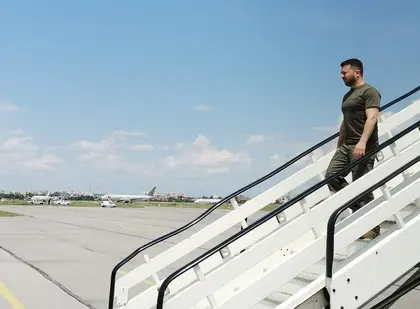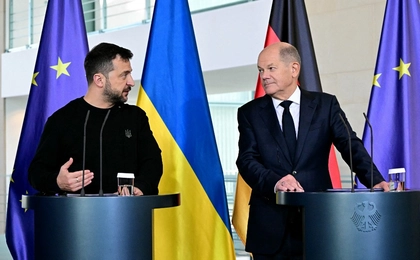Ukrainian President Volodymyr Zelensky arrived Thursday in Bulgaria, a major arms maker and ally, for talks that are to include Kyiv’s push to join NATO.
Zelensky said on Telegram he would hold “in-depth talks” with Bulgarian Prime Minister Nikolay Denkov, as well as meet with President Rumen Radev, other government officials and parliamentarians.
JOIN US ON TELEGRAM
Follow our coverage of the war on the @Kyivpost_official.
On the agenda are “defence support, Ukraine’s Euro-Atlantic integration, the NATO summit, security guarantees and the implementation of the Peace Formula,” he added.
“A joint declaration on the Euro-Atlantic integration of Ukraine and a memorandum of cooperation in the field of energy will be signed,” the Bulgarian government statement said.
Public TV was broadcasting images of Zelensky’s motorcade, leaving the airport.
The one-day visit comes as Bulgaria was preparing to approve sending military aid directly to Ukraine, reversing its former practise of delivering arms to Kyiv via third countries.
In a pre-taped TV interview broadcast Wednesday, Zelensky said that slow weapons deliveries to Ukraine delayed Kyiv’s planned counteroffensive, allowing Russia to bolster its defences in occupied areas including with mines.
Bulgaria -- an EU and NATO member but historically and culturally close to Moscow -- has been deeply divided over the issue of sending arms to the war-torn country.

Adding Fuel to the Fire
Yet, Bulgaria’s munitions factories have been running at full capacity since Russia’s invasion of Ukraine.
Last year, exports from Bulgaria’s booming arms industry were worth an estimated $4.3 billion (about four billion euros) -- triple the previous record set in 2017.
Until now, third countries acted as intermediaries to deliver weapons to Ukraine, a solution found at the start of the war by then-prime minister Kiril Petkov.
“Almost everything we received in the early days of the conflict came from our Bulgarian partners,” Ukraine presidential adviser Mykhailo Podolyak recently said on Bulgarian television NOVA.
You can also highlight the text and press Ctrl + Enter






